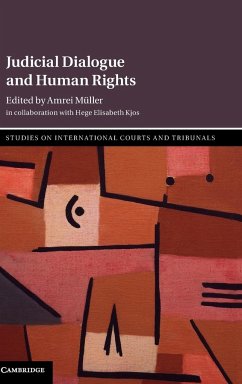Judicial Dialogue and Human Rights
Herausgeber: Müller, Amrei; Kjos, Hege Elizabeth
Judicial Dialogue and Human Rights
Herausgeber: Müller, Amrei; Kjos, Hege Elizabeth
- Gebundenes Buch
- Merkliste
- Auf die Merkliste
- Bewerten Bewerten
- Teilen
- Produkt teilen
- Produkterinnerung
- Produkterinnerung
A comprehensive analysis of the extent, method, purpose and effects of domestic and international courts' judicial dialogue on human rights.
Andere Kunden interessierten sich auch für
![International Judicial Review International Judicial Review]() Shai Dothan (University of Copenhagen)International Judicial Review47,99 €
Shai Dothan (University of Copenhagen)International Judicial Review47,99 €![Judicial Convergence and Fragmentation in International Human Rights Law Judicial Convergence and Fragmentation in International Human Rights Law]() Elena Abrusci (Brunel University)Judicial Convergence and Fragmentation in International Human Rights Law113,99 €
Elena Abrusci (Brunel University)Judicial Convergence and Fragmentation in International Human Rights Law113,99 €![Critical Debates on Counter-Terrorism Judicial Review Critical Debates on Counter-Terrorism Judicial Review]() Critical Debates on Counter-Terrorism Judicial Review42,99 €
Critical Debates on Counter-Terrorism Judicial Review42,99 €![The Judicial Application of Human Rights Law The Judicial Application of Human Rights Law]() Nihal JayawickramaThe Judicial Application of Human Rights Law282,99 €
Nihal JayawickramaThe Judicial Application of Human Rights Law282,99 €![Science and Judicial Reasoning Science and Judicial Reasoning]() Katalin SulyokScience and Judicial Reasoning47,99 €
Katalin SulyokScience and Judicial Reasoning47,99 €![Establishing Judicial Authority in International Economic Law Establishing Judicial Authority in International Economic Law]() Establishing Judicial Authority in International Economic Law114,99 €
Establishing Judicial Authority in International Economic Law114,99 €![Reputation and Judicial Tactics Reputation and Judicial Tactics]() Shai Dothan (Tel-Aviv University)Reputation and Judicial Tactics42,99 €
Shai Dothan (Tel-Aviv University)Reputation and Judicial Tactics42,99 €-
-
-
A comprehensive analysis of the extent, method, purpose and effects of domestic and international courts' judicial dialogue on human rights.
Hinweis: Dieser Artikel kann nur an eine deutsche Lieferadresse ausgeliefert werden.
Hinweis: Dieser Artikel kann nur an eine deutsche Lieferadresse ausgeliefert werden.
Produktdetails
- Produktdetails
- Studies on International Courts and Tribunals
- Verlag: Cambridge University Press
- Seitenzahl: 640
- Erscheinungstermin: 6. März 2017
- Englisch
- Abmessung: 235mm x 157mm x 39mm
- Gewicht: 1058g
- ISBN-13: 9781107173583
- ISBN-10: 1107173582
- Artikelnr.: 46985226
- Herstellerkennzeichnung
- Books on Demand GmbH
- In de Tarpen 42
- 22848 Norderstedt
- info@bod.de
- 040 53433511
- Studies on International Courts and Tribunals
- Verlag: Cambridge University Press
- Seitenzahl: 640
- Erscheinungstermin: 6. März 2017
- Englisch
- Abmessung: 235mm x 157mm x 39mm
- Gewicht: 1058g
- ISBN-13: 9781107173583
- ISBN-10: 1107173582
- Artikelnr.: 46985226
- Herstellerkennzeichnung
- Books on Demand GmbH
- In de Tarpen 42
- 22848 Norderstedt
- info@bod.de
- 040 53433511
1. Introduction. Judicial dialogue and human rights Amrei Müller and Hege
Elisabeth Kjos; 2. Judicial dialogue on international human rights law in
Poland and Eastern Europe Izabela Skomerska Muchowska; 3. Horizontal
judicial dialogue on human rights: the practice of constitutional courts in
South America Michael Freitas Mohallem; 4. The Supreme Court of Canada's
Transnational Judicial Communication on Human Rights (1982-2014): an
empirical assessment Gianluca Gentili and Elaine Mak; 5. Ideological
barriers to judicial dialogue: a study of the laws establishing Shar¿'ah
courts in Malaysia and Nigeria Azizat O. Amoloye-Adebayo; 6. Complementary
protection and domestic courts: the extent, method, purpose and effects of
judicial dialogue Naomi Hart; 7. The construction of same-sex families in
Western Europe through legislative and judicial dialogues: the role of
national legislatures and supranational courts Daniele Gallo and Matteo M.
Winkler; Part I. Reports on Practice: Domestic Judges: 8. Engaging in
judicial dialogue: some reflections from the United Kingdom Supreme Court
The Right Hon. Lord Carnwath of Notting Hill; 9. Engaging in judicial
dialogue: the practice of the German Federal Constitutional Court Andreas
Paulus; 10. Judicial dialogue: the experience of Italy Raffaele Sabato; 11.
The ECtHR's engagement with German and Russian courts' decisions:
encouraging effective cooperation to secure ECHR rights Amrei Müller; 12.
Encouraging judicial dialogue: the contribution of human rights NGOs'
briefs to the European Court of Human Rights Laura Van Den Eynde; Part II.
Reports on Practice: ECtHR Judges: 13. Dialogues between the Strasbourg
Court and national courts: a note Luis López Guerra; 14. The ECtHR's use of
decisions of domestic courts from states not involved in the case and of
other Council of Europe bodies Erik Møse; 15. The ECtHR' use of decisions
of international courts and quasi-judicial bodies Angelika Nußberger;
16. From judicial dialogue to cosmopolitan norms: enhancing democracy in
globalised states Clara Marsan-Raventós; 17. Dialogue or interaction? A
non-cosmopolitan reading of transjudicial communication Luca Pasquet; 18
Conclusion Amrei Müller.
Elisabeth Kjos; 2. Judicial dialogue on international human rights law in
Poland and Eastern Europe Izabela Skomerska Muchowska; 3. Horizontal
judicial dialogue on human rights: the practice of constitutional courts in
South America Michael Freitas Mohallem; 4. The Supreme Court of Canada's
Transnational Judicial Communication on Human Rights (1982-2014): an
empirical assessment Gianluca Gentili and Elaine Mak; 5. Ideological
barriers to judicial dialogue: a study of the laws establishing Shar¿'ah
courts in Malaysia and Nigeria Azizat O. Amoloye-Adebayo; 6. Complementary
protection and domestic courts: the extent, method, purpose and effects of
judicial dialogue Naomi Hart; 7. The construction of same-sex families in
Western Europe through legislative and judicial dialogues: the role of
national legislatures and supranational courts Daniele Gallo and Matteo M.
Winkler; Part I. Reports on Practice: Domestic Judges: 8. Engaging in
judicial dialogue: some reflections from the United Kingdom Supreme Court
The Right Hon. Lord Carnwath of Notting Hill; 9. Engaging in judicial
dialogue: the practice of the German Federal Constitutional Court Andreas
Paulus; 10. Judicial dialogue: the experience of Italy Raffaele Sabato; 11.
The ECtHR's engagement with German and Russian courts' decisions:
encouraging effective cooperation to secure ECHR rights Amrei Müller; 12.
Encouraging judicial dialogue: the contribution of human rights NGOs'
briefs to the European Court of Human Rights Laura Van Den Eynde; Part II.
Reports on Practice: ECtHR Judges: 13. Dialogues between the Strasbourg
Court and national courts: a note Luis López Guerra; 14. The ECtHR's use of
decisions of domestic courts from states not involved in the case and of
other Council of Europe bodies Erik Møse; 15. The ECtHR' use of decisions
of international courts and quasi-judicial bodies Angelika Nußberger;
16. From judicial dialogue to cosmopolitan norms: enhancing democracy in
globalised states Clara Marsan-Raventós; 17. Dialogue or interaction? A
non-cosmopolitan reading of transjudicial communication Luca Pasquet; 18
Conclusion Amrei Müller.
1. Introduction. Judicial dialogue and human rights Amrei Müller and Hege
Elisabeth Kjos; 2. Judicial dialogue on international human rights law in
Poland and Eastern Europe Izabela Skomerska Muchowska; 3. Horizontal
judicial dialogue on human rights: the practice of constitutional courts in
South America Michael Freitas Mohallem; 4. The Supreme Court of Canada's
Transnational Judicial Communication on Human Rights (1982-2014): an
empirical assessment Gianluca Gentili and Elaine Mak; 5. Ideological
barriers to judicial dialogue: a study of the laws establishing Shar¿'ah
courts in Malaysia and Nigeria Azizat O. Amoloye-Adebayo; 6. Complementary
protection and domestic courts: the extent, method, purpose and effects of
judicial dialogue Naomi Hart; 7. The construction of same-sex families in
Western Europe through legislative and judicial dialogues: the role of
national legislatures and supranational courts Daniele Gallo and Matteo M.
Winkler; Part I. Reports on Practice: Domestic Judges: 8. Engaging in
judicial dialogue: some reflections from the United Kingdom Supreme Court
The Right Hon. Lord Carnwath of Notting Hill; 9. Engaging in judicial
dialogue: the practice of the German Federal Constitutional Court Andreas
Paulus; 10. Judicial dialogue: the experience of Italy Raffaele Sabato; 11.
The ECtHR's engagement with German and Russian courts' decisions:
encouraging effective cooperation to secure ECHR rights Amrei Müller; 12.
Encouraging judicial dialogue: the contribution of human rights NGOs'
briefs to the European Court of Human Rights Laura Van Den Eynde; Part II.
Reports on Practice: ECtHR Judges: 13. Dialogues between the Strasbourg
Court and national courts: a note Luis López Guerra; 14. The ECtHR's use of
decisions of domestic courts from states not involved in the case and of
other Council of Europe bodies Erik Møse; 15. The ECtHR' use of decisions
of international courts and quasi-judicial bodies Angelika Nußberger;
16. From judicial dialogue to cosmopolitan norms: enhancing democracy in
globalised states Clara Marsan-Raventós; 17. Dialogue or interaction? A
non-cosmopolitan reading of transjudicial communication Luca Pasquet; 18
Conclusion Amrei Müller.
Elisabeth Kjos; 2. Judicial dialogue on international human rights law in
Poland and Eastern Europe Izabela Skomerska Muchowska; 3. Horizontal
judicial dialogue on human rights: the practice of constitutional courts in
South America Michael Freitas Mohallem; 4. The Supreme Court of Canada's
Transnational Judicial Communication on Human Rights (1982-2014): an
empirical assessment Gianluca Gentili and Elaine Mak; 5. Ideological
barriers to judicial dialogue: a study of the laws establishing Shar¿'ah
courts in Malaysia and Nigeria Azizat O. Amoloye-Adebayo; 6. Complementary
protection and domestic courts: the extent, method, purpose and effects of
judicial dialogue Naomi Hart; 7. The construction of same-sex families in
Western Europe through legislative and judicial dialogues: the role of
national legislatures and supranational courts Daniele Gallo and Matteo M.
Winkler; Part I. Reports on Practice: Domestic Judges: 8. Engaging in
judicial dialogue: some reflections from the United Kingdom Supreme Court
The Right Hon. Lord Carnwath of Notting Hill; 9. Engaging in judicial
dialogue: the practice of the German Federal Constitutional Court Andreas
Paulus; 10. Judicial dialogue: the experience of Italy Raffaele Sabato; 11.
The ECtHR's engagement with German and Russian courts' decisions:
encouraging effective cooperation to secure ECHR rights Amrei Müller; 12.
Encouraging judicial dialogue: the contribution of human rights NGOs'
briefs to the European Court of Human Rights Laura Van Den Eynde; Part II.
Reports on Practice: ECtHR Judges: 13. Dialogues between the Strasbourg
Court and national courts: a note Luis López Guerra; 14. The ECtHR's use of
decisions of domestic courts from states not involved in the case and of
other Council of Europe bodies Erik Møse; 15. The ECtHR' use of decisions
of international courts and quasi-judicial bodies Angelika Nußberger;
16. From judicial dialogue to cosmopolitan norms: enhancing democracy in
globalised states Clara Marsan-Raventós; 17. Dialogue or interaction? A
non-cosmopolitan reading of transjudicial communication Luca Pasquet; 18
Conclusion Amrei Müller.








